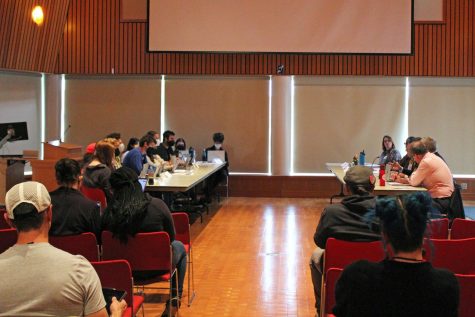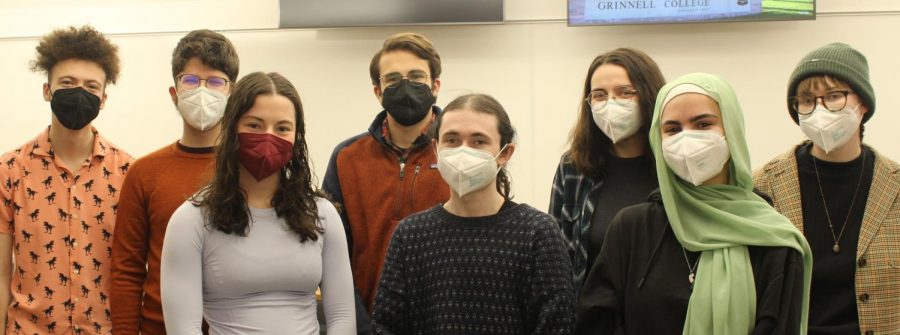UGSDW President calls for strike date
The Union of Grinnell Student Dining Workers (UGSDW) announced their new leadership board for the Spring 2023 semester. From left to right: Lu Johnston `24, Sam Hiller `25, Hannah Sweet `25, Secretary-Treasurer Con- rad Dahm `26, Kelly Banfield `24, President Lena Wiebe `25, Amani Alqaisi `25, Jules Covitz `24. Not pictured: Malcolm Galpern-Levin `24, Lyn Guinto `25.
February 13, 2023
The president of the Union of Grinnell Student Dining Workers (UGSDW), Lena Wiebe `25, has called for a strike date following the events of the Dec. 8 collective bargaining meeting last semester. During the bargaining session, the UGSDW collective bargaining team officially proposed their base wage of $20 an hour to Grinnell College’s bargaining team; the College responded with a $10.75 an hour base wage.
Both bargaining teams have expressed their desire to continue to negotiate towards an agreed upon contract, but according to some UGSDW members and leadership, the College and UGSDW may quickly be approaching an impasse over wages.
“We’re certainly not at that point [of legal impasse] yet,” Wiebe said. “What I will say is that the College indicated to us at our last bargaining session before break … that we might be close to impasse based on our proposal and their proposal … They also told us that if we were expecting them to meet us somewhere in the middle between wage proposals, we might find it frustrating.”
In her conversation with the S&B, Wiebe also raised the issues of Just Cause, a set of protections that provide guidelines for firings and give legal redress to workers who are found to be fired without just cause. She said she believes if the College and UGSDW bargaining teams were to come to an agreement now, it would not include all the protections UGSDW is negotiating for student workers.
“I think that from where I’ve been sitting at the bargaining table, we won’t be able to get the contract that we want without taking some kind of action. And, I think that action will probably have to be a strike just based on where I’m sitting,” Wiebe said.

the bargaining sessions (which take place on Thursdays at 4:15pm) can be found on the College website. (Maddi Shinall)
Currently, there is no contract covering all student workers of UGSDW. Under the current collective bargaining agreement between the College and UGSDW, which covers only dining workers, dining workers are not able to participate in a lawful strike until this agreement expires on June 30, 2023.
“While dining workers cannot go on strike, they can honor a strike,” Wiebe said.
Under Article 2, Section 4 of the collective bargaining agreement between the College and UGSDW, dining workers would not be punished for refusing to cross a primary labor union picket line legally established by other Grinnell student workers.
A primary picket line takes place at the workplace of the employers that workers have a dispute with. For Dining Hall workers, this would need to take place outside of the Joe Rosenfield Center (JRC). If
a strike were to happen, Dining Hall workers who report for their shift would be crossing the picket line.
Makaila Hootman `25, a student worker in the mailroom, shared what the implications of a strike might mean for some low-income students. Though UGSDW has a strike-pay fund, which is a fund that would help continue to pay striking workers and is maintained by worker dues, this does not necessarily solve issues with students enrolled in a payroll deduction agreement.
“Strike wages might be great, but a lot of people use this [wages from on-campus jobs] to pay for their tuition. And, the school is not going to take this money as a substitute for their tuition,” Hootman said.
Morgan Lee `26 said the fight for a higher wage would likely benefit low-income students. “I’m all for it [a strike date],” she said. “My roommates talk about how hard it is, especially if you are on financial aid or you’re taking on a loan you have to pay.”
Before a strike were to officially be declared, a vote would have to be called and a majority of UGSDW members would have to be in favor of it.
When the S&B reached out to Vice President for Communications and Marketing Ellen de Graffenreid about the proposed strike date and the implications it had for the College, she declined to comment about the possible impacts of a strike.
As student workers, all staff members of the S&B will be included in future collective bargaining. The S&B remains an independent newspaper and is committed to maintaining its integrity in reporting.
Editor’s note: This article has been updated to correctly reflect the nature of Ellen de Graffenreid’s decline to comment, which was specifically in relation to the hypothetical nature of the possible impacts of a strike on campus. Updated Mar. 6, 2023. 5:00pm.



















































